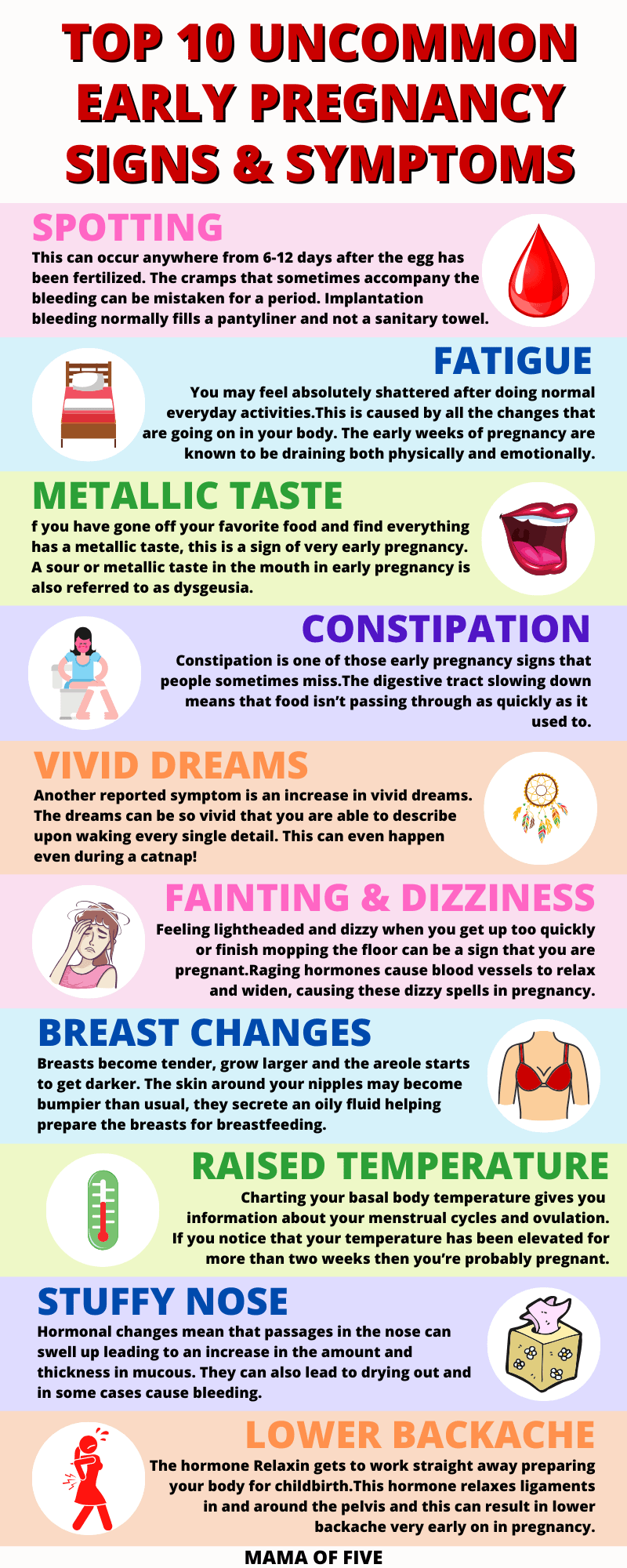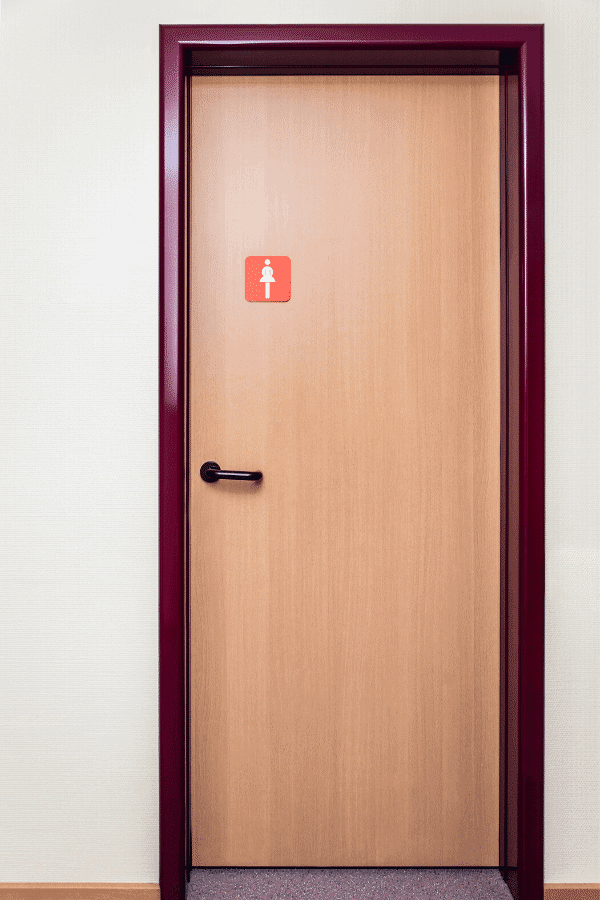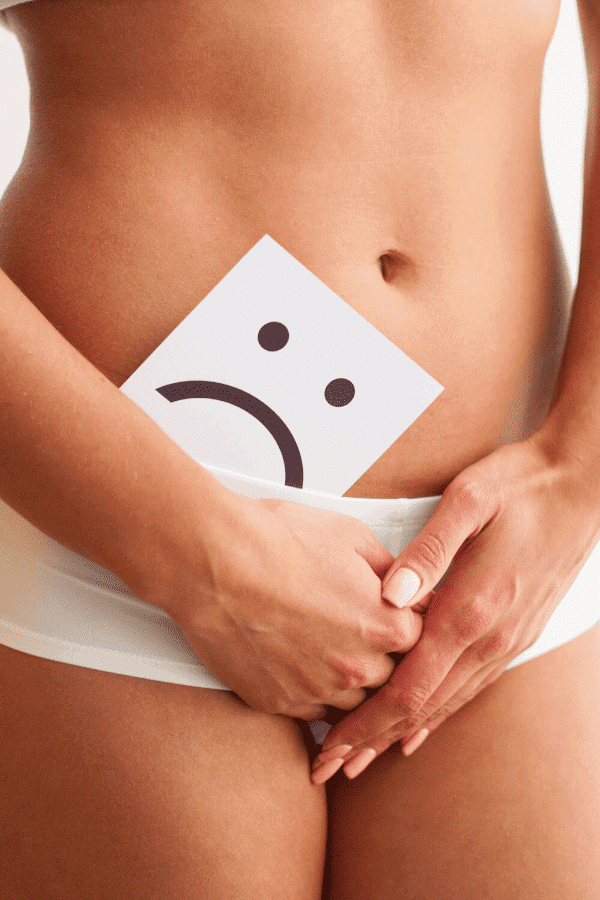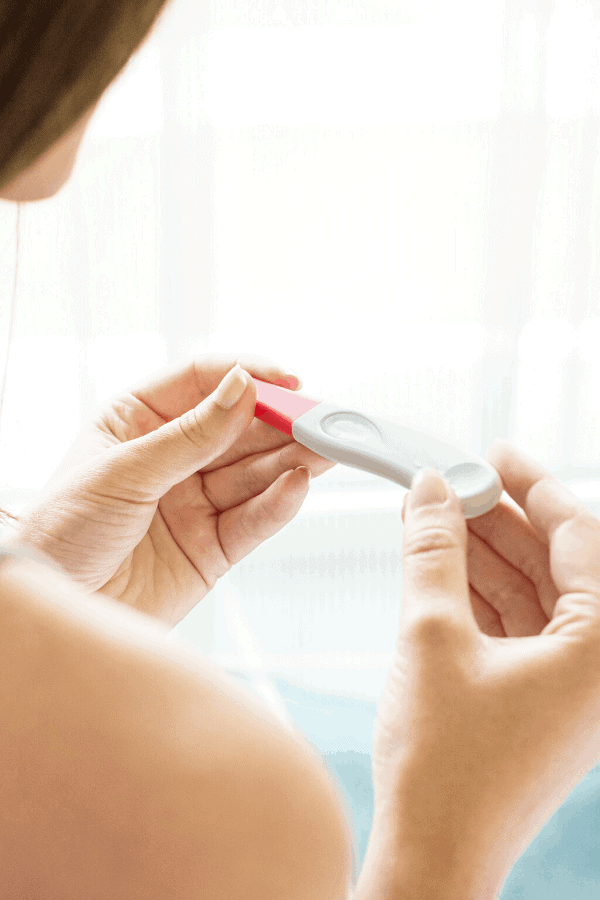If you’re on the hunt for signs of very early pregnancy, look no further – we’ve compiled a list of 26 potential symptoms that can appear as early as two weeks after conception.
It’s not uncommon to scrutinize every twinge, ache, and unusual sensation to determine whether you’re pregnant. For those eagerly anticipating a pregnancy or trying to conceive, this period of waiting can be filled with anticipation and anxiety.
These early symptoms can be experienced as early as the second or third week after conception and can be indicative of pregnancy even in breastfeeding women, who have polycystic ovary syndrome (PCOS), or are on birth control pills.
From nausea and fatigue to changes in appetite and breast tenderness, these signs can give you an early indication of pregnancy before a missed period.
However, it’s important to note that many of these symptoms can also be caused by other factors and should not be relied upon as the sole indicator of pregnancy.
As always, consulting with a medical professional is the best way to confirm a pregnancy and receive appropriate guidance on managing any associated symptoms.
As an Amazon Associate I earn from qualifying purchases. The links below may be affiliate links. Please read my disclosure policy for more information.
Here are the 26 possible early pregnancy symptoms before a missed period.
Just a little reminder that only a positive pregnancy test can confirm you are pregnant.
1. Sensitivity to Smells
A very common sign of pregnancy is the heightened sense of smell. It could be food, drink, toiletries, detergents, or even people. This strange side effect is very real when you are going through it.
Some moms we spoke to also reported experiencing a heightened sense of smell during the early weeks of pregnancy.
They mentioned that certain smells that were previously tolerable or even pleasant became unbearable and caused them discomfort or nausea.
One mom, in particular, mentioned that the smell of her husband’s cologne made her feel sick, similar to the situation described in the original statement.
So, if you can smell dog poop before you get to the park or someone having a sneaky cigarette a few blocks away you are most probably pregnant!
2. Metallic Taste in Your Mouth

For many women, pregnancy can bring about a host of physical changes and symptoms, some of which may be quite unexpected. One such symptom is a sudden aversion to favorite foods and the perception of a metallic taste in everything.
During the early stages of her pregnancy, one woman we spoke to recalls having an unusually heightened sense of taste.
The taste of tea, which was previously a beloved beverage, became too strong for her to enjoy. She also found that even bottled water had a strange flavor.
In an attempt to gauge the extent of this change in taste, she asked her husband if he too could taste these peculiar flavors. He confirmed that he couldn’t detect anything unusual, leading her to believe that this heightened sense of taste was a result of her pregnancy.
This phenomenon is not uncommon among expectant mothers, with many reporting experiencing changes in their taste buds during pregnancy.
A sour or metallic taste in the mouth in early pregnancy is also referred to as dysgeusia.
3. Breast Changes

Many women report that they can feel changes in their breasts even before they had confirmed that they were indeed pregnant.
They notice that the breasts become tender, grow larger and the areole starts to get darker.
This is due to the hormone levels rapidly increasing after conception, preparing the glands inside the breasts to prepare for milk production when the baby is born.
The skin around your nipples may also become bumpy or bumpier than usual, known as ‘Montgomery’s tubercules’ They secrete an oily fluid helping prepare the breasts for breastfeeding.
During early pregnancy, it is not uncommon for women to notice their breast veins becoming more noticeable, with some reporting a green or blue color.
Any breast tenderness should settle as the pregnancy progresses, but it is vitally important that you invest in a well-fitting supportive bra as this will help reduce swelling and sagging later.
4. Fatigue

Some women may experience tiredness that is not like your normal tiredness, you may feel absolutely shattered after doing normal everyday activities.
The exhaustion experienced by many women during early pregnancy can be attributed to the increased demands being placed on the body as it begins to prepare for pregnancy.
Hormonal changes, increased blood volume, and the growth and development of the placenta all require a significant amount of energy and resources, leaving many women feeling tired and worn out.
Listen to your body and try and get as much rest, eat well, and stay hydrated in these early weeks.
5. Lack of PMS Symptoms

Some women suffer terribly from premenstrual syndrome; tender breasts, cramps in their stomach, back and shooting pains down their legs, feeling exhausted, mood changes, and suffering from migraines.
There is a crossover between some early signs of pregnancy and PMS which could cause some confusion.
Try and see if there are any additional PMS symptoms on this list that you don’t usually suffer from.
So, when your menstrual period is due, and you don’t get even the slightest sign that your period is coming, it could be a sign that you are pregnant.
6. Raised Basal Body Temperature
By tracking your basal body temperature (BBT) can give you great insight and information about your menstrual cycles and ovulation dates.
To use this method, all you need is a basal thermometer, which is a specialized thermometer that is more sensitive to small changes in body temperature.
Charting this information will tell you when you are ovulating or having fertility issues.
For those who have been charting their BBT for a few months, this is an excellent way of knowing you are pregnant before taking a test.
If you have been charting and notice that your temperature has been elevated for more than two weeks then you’re probably pregnant.
7. Bloating

Can’t zip up your favorite pants? Hormonal changes mean that you may be more susceptible to bloating.
The extra puffiness from the bloating is why sometimes your clothes feel snug around your tummy in the early weeks of pregnancy, even though your uterus is still quite small.
The increase in gas during pregnancy is caused by the higher level of progesterone in your body leading to an increase in digestive issues.
Normally when you get your period, progesterone levels plummet, helping the bloat disappear.
If you find no sign of your period and you are still bloated, then it’s likely you are pregnant.
8. Headaches

Another issue caused by hormonal changes is headaches.
It is reported that the extra increase in blood flow circulating in your body could contribute to headaches. Experiencing headaches is, therefore, another early sign of pregnancy.
These headaches can also be bought on if you are dehydrated and not drinking enough water and if you are anemic.
The good news is that as your pregnancy progresses, it should become less frequent.
9. Stuffy Nose or Having a Cold
If you are suffering from a blocked nose or cold-like symptoms, then this could also be seen as a weird early indicator of pregnancy.
Hormonal changes mean that passages in the nose can swell up leading to an increase in the amount and thickness of mucous. They can also lead to drying out and, in some cases, cause bleeding.
10. Food Aversions and Cravings
Experiencing sudden changes in food preferences and aversions is a common phenomenon during pregnancy. This can result in a shift from liking certain foods to disliking them, and vice versa. Additionally, pregnant individuals may develop a liking for unusual food combinations, such as ice cream and pickles, which they may not have enjoyed before.
It is also common for pregnant individuals to feel queasy or nauseous when exposed to certain food odors. This can make it challenging for them to eat certain foods, especially those that are pungent or strong-smelling.
Furthermore, during pregnancy, there is a tendency for the body to crave more carbohydrates. This is because carbs are easily metabolized and can provide sustained energy levels. Therefore, it is not uncommon for pregnant individuals to consume more carb-rich foods to meet their energy demands.
11. Mood Changes
Crying when someone gets voted off a TV show? Or in floods of tears as your WiFi won’t be fixed until next Tuesday?
Rapid changes in hormone levels are often believed to be the cause of mood swings in early pregnancy.
Women experience feeling stressed, hugely emotional, easily irritated, and even crying spells without actually knowing why.
These mood swings are often seen as the first sign of pregnancy in some ladies.
12. Constipation

The same hormones that caused your bloating are also to blame for your poop problems.
The fact that the digestive tract is slowing down means that food isn’t passing through as quickly as it used to. Unfortunately, this symptom can get worse as the pregnancy progresses.
To ease this problem, try and drink lots of water and eat fiber-rich food.
Constipation is one of those strange early pregnancy signs that people sometimes miss.
13. Implantation Cramps and or Bleeding
This is known as one of the earliest signs of pregnancy.
When a fertilized egg implants itself into the uterine lining, some individuals may experience spotting, which can be accompanied by cramping. This is known as implantation bleeding and typically occurs around 6-12 days after fertilization.
The cramps that sometimes accompany the bleeding can be mistaken for a period.
Implantation bleeding normally fills a pantyliner and not a sanitary towel.

14. Nausea with or without Vomiting

Many expectant mothers consider the symptom widely regarded as a classic indicator of pregnancy to be one of the most challenging experiences to manage.
Unfortunately, some women will experience nausea right from implantation, for others, it peaks between 8-12 weeks. However, for the unfortunate few they may suffer from this the whole pregnancy.
Normally referred to as morning sickness don’t be fooled by its name this can take place at any time of day and night.
15. Lower Backache
As soon as pregnancy begins, the hormone Relaxin springs into action, preparing the body for childbirth.
This hormone relaxes ligaments in and around the pelvis and this can result in lower back ache very early on in pregnancy.
16. Frequent Urination

The common assumption is that the urge to urinate frequently arises only when the growing fetus presses against the bladder, but this symptom could also be an indication of early pregnancy.
As Human Chorionic Gonadotropin (HCG) levels elevate, they cause blood flow to increase to a woman’s kidneys leading to an increase in toilet trips, up to 25% more in fact.
This will normally peak at 8-12 weeks and then sometimes gets worse towards the end of your pregnancy as the baby grows.
17. Urinary Tract Infection (UTI)
Going to the bathroom more often is a common first sign of pregnancy but it is also associated with having a UTI or bladder infection.
This is a common sign of early pregnancy bought on by the changing hormones in your body.
If you think you have a UTI please see your health care provider as you may need antibiotics.
18. Increase in Vaginal Discharge

Your body’s way of cleaning the cervix is through a thick, milky, musky smelling discharge known as leukorrhea.
Although it’s common throughout your life if can increase dramatically for some during pregnancy.
19. Lots of Gas
Increased fluctuance and gas are a common symptom of pregnancy.
The increase of progesterone that happens when you conceive relaxes your muscles for childbirth leading to more than the average slip up.
20. Fainting and Dizziness

Experiencing dizziness and lightheadedness upon standing up too quickly or after finishing household chores such as mopping the floor can be an early indication of pregnancy.
These episodes of dizziness occur due to the hormones released during pregnancy, which cause blood vessels to relax and widen.
In fact, for many women, this symptom is the earliest and most definitive sign of pregnancy.
Some even find themselves wondering if they could be pregnant every time they faint due to this reason.
21. Intuition
Just a feeling that you might be pregnant may be the reason you are reading this.
22. Increase in saliva
Some women are hugely in tune with their own body and just ‘know’ that something is different, and often this intuition is proven to be correct
A very strange symptom of very early pregnancy being reported is that you may find you have more saliva in your mouth.
Some moms talk of excessive drooling through the night when it was never a problem before.
This is an uncommon sign of early pregnancy but you may be one of the few women that experience this.
23. Bleeding Gums
Changes in hormones can be blamed for sore, inflamed, swollen gums early on in pregnancy.
These changes can also make your gums much more vulnerable to plaque leading to bleeding also known as gingivitis or gum disease.
24. Thrush

The increase in progesterone can be blamed for our next early symptom; thrush. A quarter of all pregnant women will suffer from this.
An increase of discharge can be blamed for thrush which is also a sign of early pregnancy.
Thrush is normally accompanied by itching, soreness and stinging when you pass urine.
If you think you may have thrush go and see your doctor.
25. Vivid Dreams
Another reported symptom is an increase in vivid dreams. So vivid you able to describe upon waking every detail.
This can even happen during a catnap!
26. A Missed Period
The most obvious sign but still needs a mention.
This is the most common sign for most women that they are indeed pregnant.
If you miss a period and you still have a negative home pregnancy test, then try again in a few days’ time or a different brand of test.
If after one week your period is still a no show contact your healthcare provider for advice.
When Can I Take a Pregnancy Test?
Most experts would agree that the earliest time to test would be at 8 days after you have ovulated.
But it’s difficult to know when you ovulated even if you have had some implantation bleeding as ovulation can vary in length too.
The best day to test for a pregnancy would be on or after the day of your missed period.

Managing the Two-Week Wait: My Top Tips”
- Keep yourself distracted with things non-pregnancy related.
- Don’t get caught up in spotting symptoms.
- Stay away from the internet reading and rereading symptoms.
- Try to wait until you are due or missed your period.
- Talk to well-meaning friends.
- Stay clear of message boards; even a neckache could be a positive here!
If You Are Pregnant Then a Huge Congratulations!
If you are in fact pregnant and would like to prepare yourself for the birth, I would highly recommend you take a birth course.
A truly wonderful and affordable online birthing course you can take from home. I am recommending it because I really wish I had known about it when I had my first baby. Read my honest review of birth it up here
Planning to Breastfeed?
If you are a planner and want to learn about everything to do with pregnancy and breastfeeding, then the other online course I would recommend is Milkology.
It is a fantastic course by Stacey Stewart a qualified lactation consultant. It’s super affordable and will literally go through everything you need to be successful at breastfeeding.
The only reason for my recommendation is that I spent hundreds of dollars buying books where this course is affordable, and a real investment.
